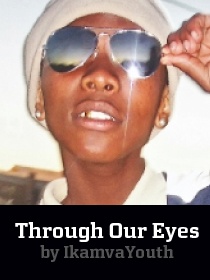
We have been studying the poetry from ‘Through Our Eyes’ in English class. My Year 9 High school students in Australia spent a few weeks reading and reflecting on the insightful and inspiring poetry from IkamvaYouth. I, their teacher, spent a year in Cape Town in 2008 and volunteered with Ikamva as a tutor as well as taking part in all the other wonderful things that were being done. I was at the exhibition of the photos from the book and ran an interactive body percussion workshop at the launch. Some of you might remember the slogan we sang: Pictures are our stories of the world through our eyes.
As a result, it was so exciting when I started teaching in High school and realised that I could use this opportunity to spread the story of IkamvaYouth, a self sustaining, innovative organisation. At the same time, I could expose my students to some new themes and introduce them to some of the passionate people I had met, through their poetry.
We spent a few classes discussing HIV and AIDS, exchanging information that is essential for all young people. This tied in very well with Thobela’s poem ‘I want the meaning of Positive’ and it sparked much conversation about HIV as a personal and global issue and what life might be like if the word ‘Positive’ took on a new meaning from the one you’d been taught as a child. ‘Do you know your status’ was also another poem that struck my students. Life can be planned. We can strive for dreams, but all that could come to nothing if we don’t know our status. ‘I had never realised’ was another poem that we enjoyed, because it told about how perspectives change as a result of experiences. Often we don’t realise things until they stare us right in the face. This poem allowed us to question our lives and our assumptions, and begin to wonder how many things ‘we’ haven’t realised yet. It also led us to discuss what might be similar in the lives of teenagers in Khayelitsha and Australia, and what things might be different.
We also spent some time looking at the Photo Gallery on the IkamveYouth website, and that allowed us to spend an afternoon seeing Khayelitsha through your eyes as well as catching a glimpse of some of the poets in the photos. Here are my students’ reflections on some of the poetry. We’d like to thank all the poets and photographers for the snapshot of their lives, that allowed us to enter and learn from the experience. I’d also like to thank Joy for allowing us to share our reflections with you.
Eva Franklin

 Lloyd Lungu
Lloyd Lungu